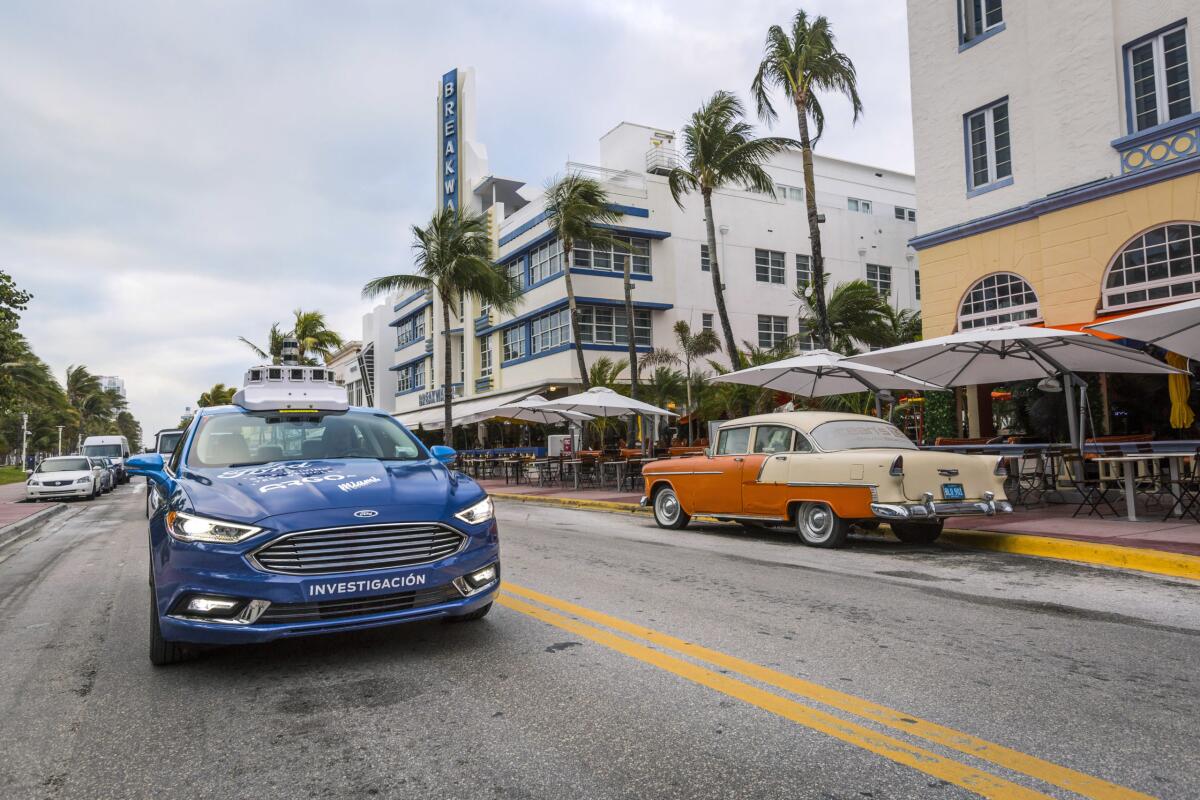Ford kills Argo AI, saying self-driving future still far off

- Share via
DETROIT — Ford said Wednesday that it is disbanding Argo AI, an autonomous vehicle company that it jointly owns with Volkswagen.
Executives said they didn’t see a path to profit on fully autonomous vehicles, and it will now focus on partially automated driver-assist systems, which need to be monitored by humans.
Ford is taking a $2.7-billion accounting charge to reduce the value of its investment in Pittsburgh-based Argo, and it’s writing off a cash investment of about $500 million. Due largely to the noncash accounting charge, Ford reported a net loss of $827 million from July through September.
Ford said that it and Volkswagen would hire many of Argo’s 2,000 employees and that some of its offices would remain open.
The automaker, based in Dearborn, Mich., said in a news release that it determined large-scale commercialization of self-driving vehicles “will be further out than originally anticipated.” Yet customer enthusiasm for driver-assist systems warranted additional commitment of capital. Ford also said Argo had been unable to attract more investors.
Learning to predict local traffic quirks is a challenge for companies looking to develop safe self-driving cars. To speed the process, Argo AI is testing its robotaxis in a half-dozen cities at once.
“We’ve looked at this every way that you can,” Chief Financial Officer John Lawler told reporters Wednesday. “We just see the profitability, given the investment that’s going to be required, a long way out.”
Doug Field, Ford’s chief technology officer, said a breakthrough will be needed to make self-driving cars work, and then further advances would be required before the vehicles could be deployed widely. Sensors on autonomous vehicles can’t be produced in high volume or at price points that consumers can afford, Field said. The vehicles also require high-performance computers, he said.
“There’s a lot of work to not only just crack the technical problem, but then turn that into a high-volume reliable vehicle,” Field said.
Other robotaxi companies, however, are moving ahead, including Waymo, which recently announced Los Angeles will follow Phoenix and San Francisco for its as yet small-scale robotaxi services. Cruise, owned by General Motors, operates robotaxis in San Francisco. Hyundai-owned Motional had made no indications that it plans to exit the field. Tesla continues to sell technology it calls Full Self-Driving, although those cars are unable to drive themselves, fully or otherwise.
With driverless car services already operating in Phoenix and San Francisco, Waymo says Los Angeles is next on its list.
When Ford first invested in Argo AI in 2017, there was a lot of talk about driverless cars as a consumer-purchase item. Those days appear to by far off.
Some Argo facilities will become Ford buildings, and many of the engineers and software developers will become part of Ford’s mission to develop better driver-assist systems, the company said.
Los Angeles Times staff writer Russ Mitchell contributed to this report.
More to Read
Inside the business of entertainment
The Wide Shot brings you news, analysis and insights on everything from streaming wars to production — and what it all means for the future.
You may occasionally receive promotional content from the Los Angeles Times.










